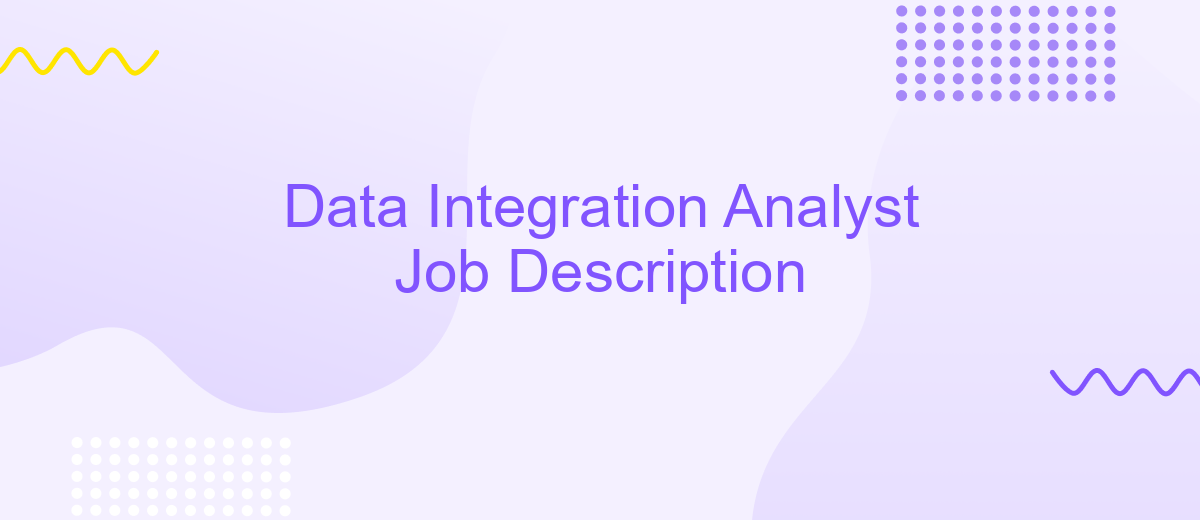Data Integration Analyst Job Description
A Data Integration Analyst plays a crucial role in today's data-driven world, ensuring seamless data flow across various systems and platforms. This position requires a keen eye for detail, technical expertise, and strong problem-solving skills. In this article, we will explore the key responsibilities, required qualifications, and essential skills necessary to excel in this dynamic and impactful role.
Job Description
As a Data Integration Analyst, you will play a crucial role in ensuring seamless data flow between various systems and platforms. You will be responsible for analyzing, designing, and implementing data integration solutions to support business objectives and enhance operational efficiency.
- Analyze data integration requirements and develop technical specifications.
- Design and implement data integration solutions using tools such as ApiX-Drive.
- Monitor and troubleshoot data integration processes to ensure data accuracy and integrity.
- Collaborate with cross-functional teams to understand data needs and provide integration support.
- Create and maintain documentation for data integration processes and workflows.
To succeed in this role, you should have a strong understanding of data integration principles, excellent problem-solving skills, and the ability to work with various data formats and systems. Experience with ApiX-Drive or similar integration platforms is highly desirable, as it will enable you to streamline and automate data workflows effectively.
Responsibilities

As a Data Integration Analyst, you will be responsible for designing, developing, and maintaining data integration solutions to ensure seamless data flow across various systems. You will work closely with cross-functional teams to understand data requirements, map data sources, and implement integration processes. Utilizing tools such as ApiX-Drive, you will set up and manage automated data integrations to streamline workflows and enhance data accuracy.
In addition, you will monitor and troubleshoot data integration issues, ensuring timely resolution to minimize disruption to business operations. You will also document integration processes, develop best practices, and provide training to team members on data integration tools and methodologies. Your role will be crucial in optimizing data management and contributing to informed decision-making within the organization.
Qualifications

To excel as a Data Integration Analyst, candidates must possess a blend of technical and analytical skills, along with a keen understanding of data management principles. A strong foundation in data integration tools and methodologies is essential for this role.
- Bachelor's degree in Computer Science, Information Technology, or a related field.
- Proficiency in data integration tools such as ApiX-Drive, Talend, or Informatica.
- Experience with SQL and database management systems like MySQL, PostgreSQL, or Oracle.
- Strong analytical skills and the ability to troubleshoot data-related issues.
- Familiarity with ETL processes and data warehousing concepts.
- Excellent communication skills to collaborate effectively with cross-functional teams.
- Ability to manage multiple projects and meet deadlines in a fast-paced environment.
Having experience with ApiX-Drive can be particularly beneficial, as it simplifies the process of setting up and managing integrations between various applications and services. This expertise will enable you to streamline data workflows and enhance the overall efficiency of data operations.
Education

To become a Data Integration Analyst, a strong educational background is essential. Most employers require candidates to hold at least a bachelor's degree in a relevant field such as Computer Science, Information Technology, Data Science, or a related discipline. A solid foundation in these areas provides the necessary technical skills and theoretical knowledge to excel in this role.
Advanced degrees, such as a master's degree or professional certifications in data management, can further enhance a candidate's qualifications. These programs often offer specialized coursework in data integration, database management, and data analytics, which are crucial for the role. Additionally, hands-on experience through internships or related job positions can provide practical insights and skills that are highly valued by employers.
- Bachelor's degree in Computer Science, Information Technology, Data Science, or related field
- Master's degree or professional certifications in data management (preferred)
- Coursework in data integration, database management, and data analytics
- Hands-on experience through internships or related positions
Familiarity with integration platforms, such as ApiX-Drive, is also beneficial. These tools help streamline the process of connecting various data sources, ensuring seamless data flow and efficient data management. Understanding how to leverage such platforms can significantly improve a Data Integration Analyst's effectiveness and productivity.
- Automate the work of an online store or landing
- Empower through integration
- Don't spend money on programmers and integrators
- Save time by automating routine tasks
Additional Information
As a Data Integration Analyst, you will be instrumental in ensuring seamless data flow between various systems and platforms. Your role will involve collaborating with cross-functional teams to identify data requirements, design integration solutions, and troubleshoot any issues that may arise. Proficiency in tools like ApiX-Drive can significantly enhance your ability to automate data transfer processes, making your workflow more efficient and reliable.
In addition to technical skills, strong analytical and problem-solving abilities are crucial. You will need to interpret complex data sets and provide actionable insights to stakeholders. Effective communication skills are also essential, as you will be required to explain technical concepts to non-technical team members. Continuous learning and staying updated with the latest integration technologies will be key to your success in this dynamic field.
FAQ
What does a Data Integration Analyst do?
What skills are essential for a Data Integration Analyst?
How does a Data Integration Analyst ensure data quality?
What tools do Data Integration Analysts commonly use?
Why is data integration important for businesses?
Routine tasks take a lot of time from employees? Do they burn out, do not have enough working day for the main duties and important things? Do you understand that the only way out of this situation in modern realities is automation? Try Apix-Drive for free and make sure that the online connector in 5 minutes of setting up integration will remove a significant part of the routine from your life and free up time for you and your employees.


